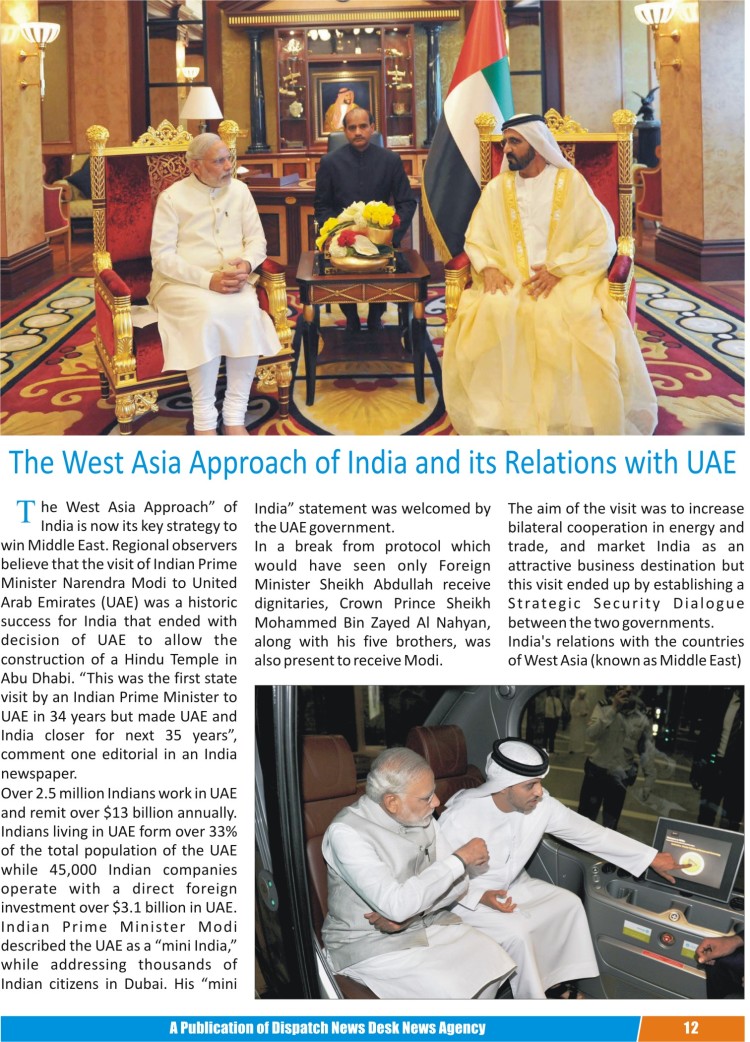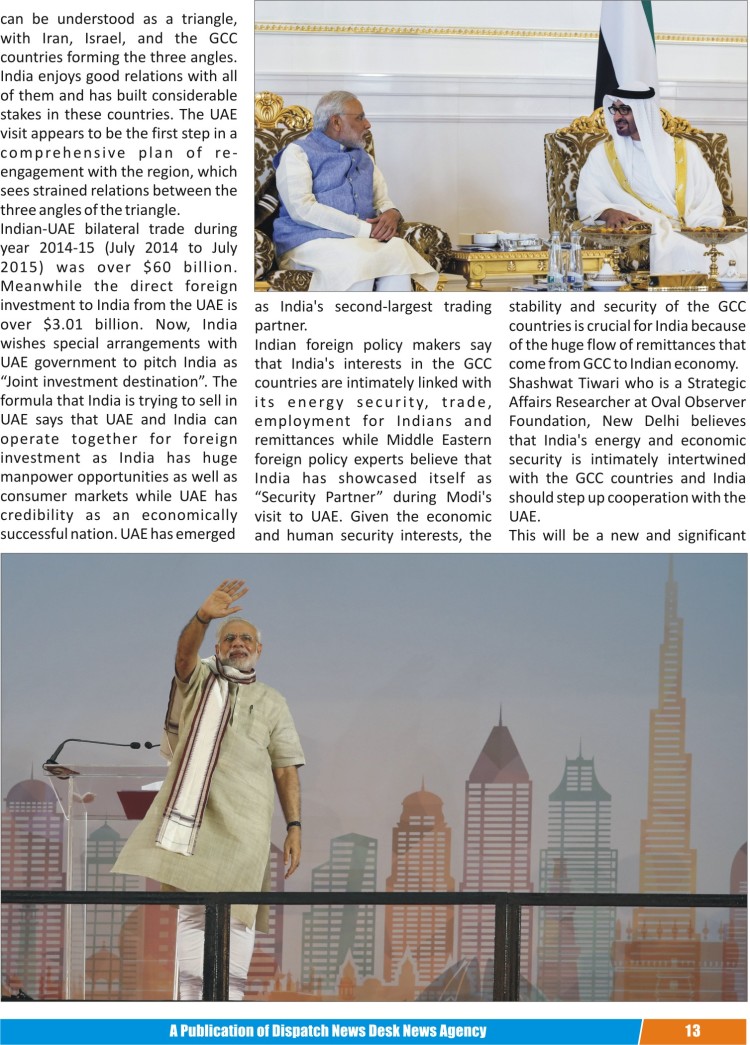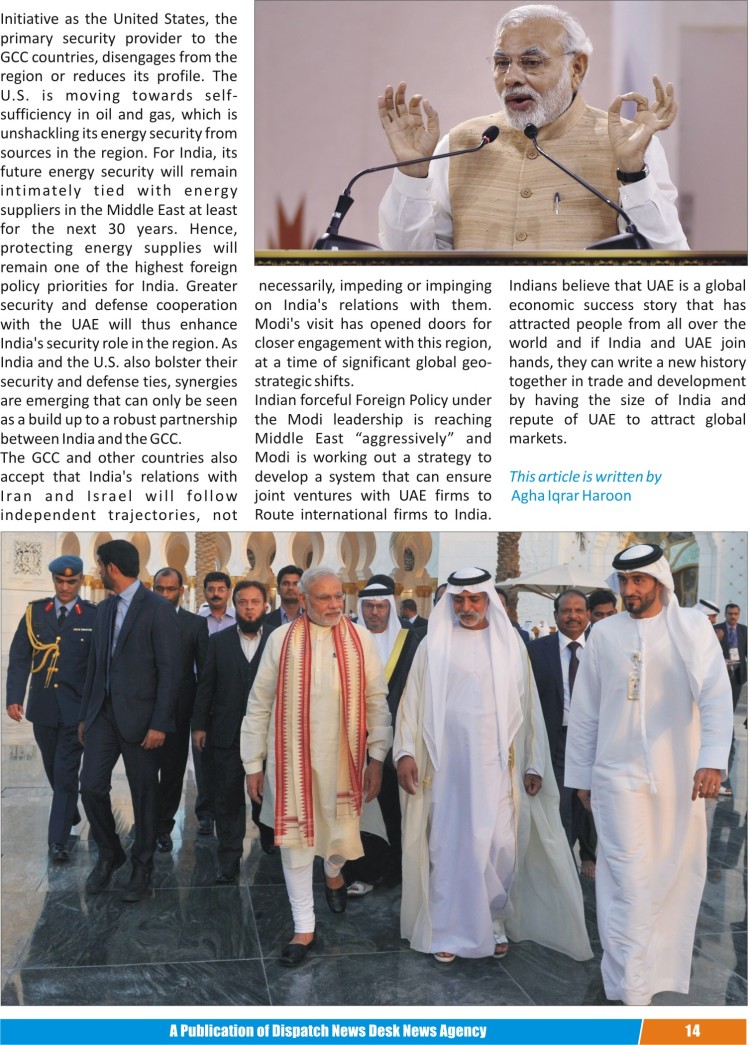The West Asia Approach of India and its relations with Middle East
By Agha Iqrar Haroon

“The West Asia Approach” of India is now its key strategy to win Middle East.
“This was the first state visit by an Indian Prime Minister to UAE in 34 years but made UAE and India closer for next 35 years”, comment one editorial in an India newspaper.
Over 2.5 million Indians work in UAE and remit over $13 billion annually. Indians living in UAE form over 33% of the total population of the UAE while 45,000 Indian companies operate with a direct foreign investment over $3.1 billion in UAE. Indian Prime Minister Modi described the UAE as a “mini India,” while addressing thousands of Indian citizens in Dubai and his “mini India” statement was welcomed by the UAE government.
In a break from protocol which would have seen only Foreign Minister Sheikh Abdullah receive dignitaries, Crown Prince Sheikh Mohammed Bin Zayed Al Nahyan, along with his five brothers, was also present to receive Modi.
The aim of the visit was to increase bilateral cooperation in energy and trade, and market India as an attractive business destination but this visit ended by establishing a Strategic Security Dialogue between the two governments.
India’s relations with the countries of West Asia (known as Middle East) can be understood as a triangle, with Iran, Israel, and the GCC countries forming the three angles. India enjoys good relations with all of them and has built considerable stakes in these countries. The UAE visit appears to be the first step in a comprehensive plan of re-engagement with the region, which sees strained relations between the three angles of the triangle.
Indian-UAE bilateral trade during year 2014-15 (July 2014 to July 2015) was over $60 billion. Meanwhile the direct foreign investment to India from the UAE is over $3.01 billion now. Now, India wishes special arrangements with UAE government to pitch India as “Joint investment destination”. The formula that India is trying to sell in UAE says that UAE and India can operate together for foreign investment as India has a huge manpower opportunities as well as consumer market while UAE has credibility as economically successful nation. UAE has emerged as India’s second-largest trading partner.
Indian foreign policy makers say that India’s interests in the GCC countries are intimately linked with its energy security, trade, employment for Indians and remittances while Middle Eastern foreign policy experts believe that India has showcased itself as “Security Partner” during Modi’s visit to UAE. Given the economic and human security interests, the stability and security of the GCC countries is crucial for India because huge flow or remittances that comes from GCC to Indian economy.
Shashwat Tiwari who is a Strategic Affairs Researcher at Oval Observer Foundation, New Delhi believes that India’s energy and economic security is intimately intertwined with the GCC countries and India should step up cooperation with the UAE.
This will be a new and significant initiative as the United States, the primary security provider to the GCC countries, disengages from the region or reduces its profile. The U.S. is moving towards self-sufficiency in oil and gas, which is unshackling its energy security from sources in the region. For India, its future energy security will remain intimately tied with energy suppliers in the Middle East at least for the next 30 years. Hence, protecting energy supplies will remain one of the highest foreign policy priorities for India. Greater security and defense cooperation with the UAE will thus enhance India’s security role in the region. As India and the U.S. also bolster their security and defense ties, synergies are emerging that can only be seen as a build up to a robust partnership between India and the GCC.
The GCC and other countries also accept that India’s relations with Iran and Israel will follow independent trajectories, not necessarily, impeding or impinging on India’s relations with them. Modi’s visit has opened doors for closer engagement with this region, at a time of significant global geo-strategic shifts.
Indian forceful Foreign Policy under the leadership Modi is reaching Middle East “aggressively” and Modi is working out a strategy to develop a system that can ensure joint ventures with UAE firms to route international firms to India that are already working in UAE while ensuring protection of UAE’s financial interests. There is no doubt that UAE is a global economic success story that has attracted people from all over the world and if India and UAE join hands, they can write a new history in trade and development by having size of India and repute of UAE to attract global market.








